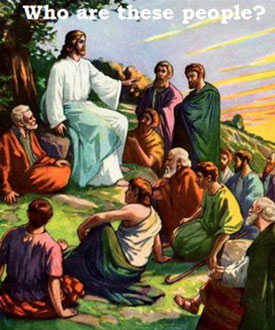The Sermon on the Mount
What do you know about the sermon? - Matthew 5

Christian values versus secular values.
- Value: The quality of being useful or desirable. It is the importance of something.
- There are Christian values and secular values.
- Christian Values: These values are acquired by reading and obeying the word of God. They are based on Biblical teachings. They include humility, spiritual poverty, purity and patience.
- Secular Values: These are values that we learn from other people like teachers, grandparents, books, magazine and movies. They include hard work, honesty, co-operation and respect.
- Some secular values are the same as Christian values, for example, respect and honesty.
- The Holy Spirit helps one develop Christian values.
- Christian values are found in the Sermon on the Mount, also called the Beatitudes. Jesus taught these values alongside their future rewards.
- Beatitude means great happiness.

The Beatitudes that Jesus taught - Matthew 5:1 - 11
Jesus taught the disciples by saying:

1. Happy are those who know they are spiritually poor for the kingdom of heaven belongs to them.
2. Happy are those who mourn for God will comfort them.
3. Happy are those who are humble for they shall receive what God has promised.
4. Happy are those whose greatest desire is to do what God requires, God will satisfy them fully.
5. Happy are those who are merciful to others, God will be merciful to them.
6. Happy are the pure in heart for they will see God.
7. Happy are the peacemakers for God will call them His children.

8. Happy are those who are persecuted because they do what God requires for the kingdom of heaven belongs to them.
9. Happy are you when people persecute you because you are my follower. A great reward is kept for you in heaven.
- From Jesus’ teachings it is clear that we should not put a lot of value on earthly things.
- Instead, striving to live a holy life stores up heavenly riches, which will last. Earthly riches will come to an end.
Christian values from the Sermon - Mattew 6: 1 - 41
Spiritual poverty
Poverty means being in a state of lacking.
“Happy are those who know they are spiritually poor; the Kingdom of heaven belongs to them!”
Matthew 5:3
What did Jesus mean by ‘spiritually poor’?
- People who know they cannot depend on their good works to get into heaven.
- Such people depend on God’s mercy and grace to save their souls from sin.
- They are gentle and humble for they know that without God, they have nothing.

Mercy
What do you understand by the word 'mercy'?
- It is the act of holding yourself back from punishing another after he/she has offended you.
- “Happy are those who are merciful to others; God will be merciful to them!” (Matthew 5:7).
- Your teachers and parents are often very forgiving.

- Sometimes they may punish you but as a sign of kindness.
- God forgave us our sins as an act of mercy.

- We too should show mercy to our friends by forgiving them their wrongs.
- We should forgive others so that God can forgive us too.
- If we do not forgive one another, God will punish us.

Charity
Can you define the word charity?
- Charity is defined as the act of showing kindness in giving help to others, for example, the poor, the orphaned and refugees.
- We can show kindness by giving clothes, food or shelter to those in need.
- In 1 Corinthians 15:58, we are told that our work for the Lord is not useless. Whatever we do for others is not in vain.
- God will reward us. In our country there are charitable organisations such as Kenya Red Cross Society and St. John’s Ambulance among others, which are known to help those in need.
- Such organisations help the needy without expecting anything back.
- God expects us to be kind to others just as He is to us.
- We can show charity to others by sharing with them our pens, books, clothes and food.
- We can also read and revise with them.
- We can also volunteer in churches, hospitals or children’s homes during the holidays.

Humility
How do you understand the term humility?
- It is thinking of oneself as not more important than others or when you lower yourself in regard to other people thinking of them as more important than who you are.
- Jane is the best pupil in Mathematics in class seven but she does not boast about it. Instead she always helps those who are not as good as she is.

- Jesus humbled Himself by choosing a donkey while going into the city of Jerusalem despite being the Messiah.

- Jesus was born into a poor family.
- He was an ordinary carpenter like His father.
- Throughout His life, He did not own anything.

- When people wanted to make Him a king, He refused and chose to remain humble.
- In His teachings, Jesus said that those who are humble are blessed for they will receive what God has promised.
As Christians:
- We need to humble ourselves for God has promised us eternal life.

- We should not boast to our friends about what we have.

- All what we have belongs to God therefore we should share with others.

- We are all equal and important to God.
- We are all God’s creation.
Purity - Matttew 5: 8, 27 - 28
- Something pure is something clean; not mixed with anything else; without evil or sin.
- Jesus wants us to be pure in our thoughts and deeds.
- Pure people do good things to others.

- We can remain pure by reading books that pass on good morals, attending church services and listening to God’s word.
- In Matthew 5:27-28 Jesus talks of sexual impurity.
- Sexual impurity can lead us into very many problems such as: unwanted pregnancies, STDs such as HIV/AIDS or early marriages.
- As one interacts with the opposite sex, one needs to be pure in thought and deed for one’s body is the temple of God.
- Jesus said, “ Happy are the pure in heart; they will see God!” Matthew 5:8
Discernment, judgement and justice and Christian life
Matthew 7:1-5
- Discernment is the ability to judge something as being good or bad. Sometimes we do something wrong and hide the truth from our parents.
- However, our parents are able to tell that something is wrong.

- Judgement is coming to a decision after carefully considering a situation.
- After a parent realises that his/her child has made a mistake, he/she will think carefully of the proper punishment to give.

- Therefore, justice is the fair or reasonable judgement given to a person who has done wrong.
- It is right or fair treatment.
- In Matthew 7:1-5 we are told to give fair treatment to others because it is in the way we judge others that God will judge us.
As Christians:
- We need to look at ourselves before we pass judgement on others.

- When passing judgement we should consider all the facts.
- We should not accept bribes to favour someone over another.
- We should show integrity when passing judgement.
- We should treat all people fairly.

Forgiveness and reconciliation - Psalm 51:1 - 4
- We need to forgive one another, so we should not keep remembering the wrongs done to us by others.
- As children of God we should be able to forgive and forget.
- When a person has wronged us we should seek reconciliation.
- If we don’t forgive, God is unhappy with us.
- When people reconcile, they put the past behind them and move on without quarrelling or feeling bad towards one another.

- In Matthew 5:43-48 Jesus tells us to forgive and love our enemies.
- Psalm 32:1 says, “Happy are those whose sins are forgiven, whose wrongs are pardoned.”
- We should turn away from our wicked ways to show that we are truly repentant.
Who is forgiven/when are we forgiven?
- God forgives us when we accept that we have sinned.
- God also forgives us when we say we are sorry and ask Him for forgiveness.
Peace and contentment
Matthew 5:23 - 24, 6:25 - 31, Romans 12:18, John 14:27
Peace
- Peace is freedom from war or violence; it is a state of calm or quiet.

- We should be at peace with our parents, friends, neighbours and the community at large.
How can we be at peace amongst ourselves?
- By loving and caring for each other.
- By using good language and not provoking others to anger.
- Respecting others and their opinions.
- Being kind to others and helping them when they are in need.
- By seeking reconciliation and not revenge.
- We can help solve other people’s problems, for example if two friends are having a quarrel we need to help them maintain peace.
- By practising justice to all.
Contentment
- Contentment is a state of being happy or satisfied with what one has or is.
- Sometimes you may feel that the clothes you have are not good enough.
- This is feeling discontent.

- You are not happy with what you have and you feel you need more.
- In Matthew 6:25-31 Jesus tells us to be satisfied with what we have.
- He tells us that the birds of the air do not sow or reap yet He feeds them.
- If we are more important than the birds of the air, how much more then will God provide for us?
How can we promote contentment?
- By praying to God to give us whatever we need.
- By being satisfied with what we have.
- We should encourage others to be satisfied with what they have.
- We should not be jealous of what other people have.
- We should trust God because He knows what is best for us, and provides for us accordingly.
- By appreciating that God has given us life, which is the greatest gift of them all.
- By remembering that heavenly riches are more important than earthly ones.
True riches - 1 Timothy 6:6
- Riches are the wealth, money or valuable possessions that we have.
- We can have a lot of money, many cars, houses and so on.
- Earthly riches help us meet our human needs.
- Jesus tells us that our worth is not calculated by how much we own.
- He said that the true riches are in our hearts.

- What we do for God makes us rich.
- By being obedient, kind, honest and humble we store our riches in heaven.
- 1Timothy 6:6 says godliness makes a person rich; therefore, a person should be satisfied with what material wealth he or she has.
- Earthly riches like cars, food, money, and houses can be stolen, destroyed or taken away but heavenly riches are stored forever.
Misuse of Wealth
- Christians should therefore not misuse the property they are given to take care of by God.
- Misuse of wealth occurs when the rich oppress the poor, underpay workers or refuse to help the needy.
- In 2 Kings 4:8-17, we read of the rich woman from Shunem.
- She provided for Elisha’s needs without him asking her.
- God, as a result, increased her wealth by giving her a son in her old age.
- We should aim to use our wealth to help others rather than just ourselves.
- God sees all we do with what He has given us and repays us in the measure we deserve.
Integrity
Matthew 6:19 - 21, 1 Corinthians 10:21, 2 Corinthians 8:21
- Integrity is the quality of being honest and having strong moral principles.
- People cheat because they are greedy or lazy.
- The ninth commandment tells us not to accuse anyone falsely.
- God hates a lying tongue.
- When we do what is right and good, we show integrity.
- When we practice integrity, we don’t expect to be paid or praised for it.
- We practice integrity without expecting anything back.
- Sometimes, a pupil begs the prefect not to report him/her to the class teacher for making noise and he/she promises to buy the prefect sweets.
- If the prefect agrees, he/she lacks integrity.
- We should do our work without favour or fear.
- We should avoid being corrupt at all costs so that we become people of high integrity.

- 2 Corinthians 8:21 tells us to do what is right before God and other people. We should be fair to others.
How can we maintain integrity?
- Praying to God to help us have good behaviour.
- Fairly exposing those who cheat to our parents/guardians or teachers.
- Obeying God and reading the Holy Bible.
- We should be honest in what we do and say.
- Our friends should be of good behaviour so that they don’t influence us into doing bad things.
- We should treat everyone equally, without favour.
- We should encourage our friends to live lives of integrity.
Living values acquired in education
1 Timothy 6:20, 2 Timothy 4:12
- We have already learnt that there are some Christian values that we acquire by reading the word of God.
- There are also other values that we learn from school.
- The living values acquired in education are:
Honesty
- This is the quality of being truthful.
- In school, we are expected to tell the truth.
- During exams or when given homework, we are expected to do our own work and not copy from others.
Co-operation
- This is doing something or working together for a common purpose.
- We should work together in groups; we are expected to help one another in order to accomplish our work.
Respect
This is having a high opinion of somebody or something. In school, we are expected to respect one another and also our teachers. We should also respect our friends’ properties
Obedience
This is doing what one is told to do willingly. We are expected to do as directed by our teachers. If we are sent we should go without complaining.
Self - discipline
This is the ability to do a particular task without being influenced by another person’s desires or feelings. In school, we are expected to do as we are told with or without our teachers being there.
Sharing
This is giving part of what we have to others.
In school we learn to share ideas, books, pens and other things.
God wants us to share what we have with others for He loves a cheerful giver2 Corinthians 9:7
























